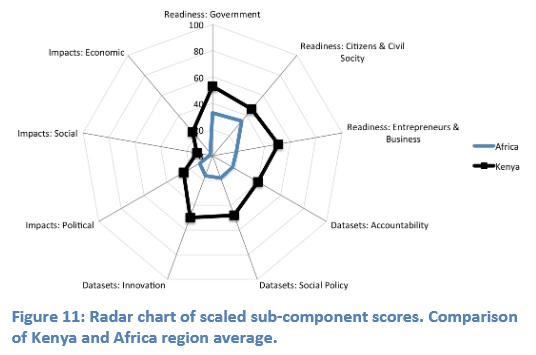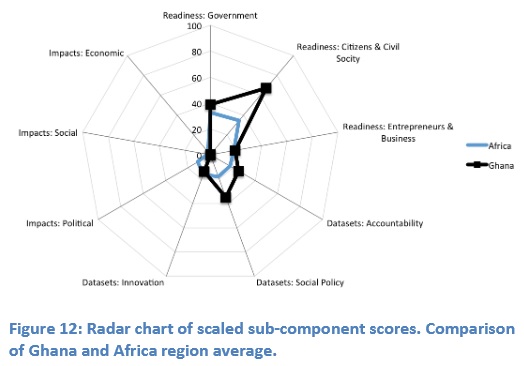Open Government Data is starting to make an impact but African initiatives are scarce
A growing number of nations have active open data initiatives but few of the associated datasets are truly open to the public. (Take, for example, the Kenyan Open Data Initiative which in two years of action has seen its ups and downs.) Similar findings of good intent but challenging execution are part of new research conducted by World Wide Web Foundation and Open Data Institute.
The Open Data Barometer looks at the context, availability, and emerging impacts of Open Government Data (OGD) in 77 countries. Such analysis is aimed to support policy makers and advocates to better understand the development of open data on a global scale. In general, researchers find that approximately half of countries surveyed have form open data policies in place. Of publicly-accessible datasets, fewer than 10% could be used to improve government, business, or social policy. Within Africa, researchers already find (minor) impacts from open data in Kenya, Morocco, Tunisia, South Africa, Uganda, Malawi, and Cameroon.
Included in the report are insights on 21 African nations: Benin, Botswana, Burkina Faso, Cameroon, Ethiopia, Ghana, Kenya, Malawi, Mali, Mauritius, Morocco, Namibia, Nigeria, Rwanda, Senegal, South Africa, Tanzania, Tunisia, Uganda, Zambia, and Zimbabwe. From the information we can see not only if a nation is ready to realize the benefits of open data, but also if the government has published data and whether the availability of open data has contributed to political, social or economic change.
African Findings:
- Morocco was the first African nation to launch an OGD initiative (in March 2011). Kenya launched one in July 2011.
- A survey of Kenyan citizens found high demand for government data but only 14% were aware of the national open data portal
- Morocco’s open data portal focuses on financial data but has not promoted the portal extensively
- Ghana launched a beta OGD initiative in 2012. More than 100 datasets are publicly available.
- African data was often provided through national statistical services
- Budgets, though often published, are not quite fully open.
- Challenges facing OGD are a lack of digital data collection and poor management of what data exists
- No African country was found linking to the African Development Bank Open Data For Africa platform
- Kenya is the leading developing country and leads Ireland and Belgium
- Nigeria’s Edo State is an exception where a regional OGD initiative was launched before a national one
- Citizens and civil society are relatively more ready than government or entrepreneurs
- Low readiness for open data is due to limited internet access and a lack of ICT training (print, radio, and mobile need to be explored)
African Rankings:
- Kenya (22nd) ranks highly for openness of government budget, government spending, public transport timetables, and crime statistics
- Morocco (40th) has a good level of openness of government budget and government spending
- Mauritius (42nd) has a moderate level of openness of government budget, international trade, education, crime statistics, environment statistics, and election results
- Rwanda (45th) has a good level of openness of international trade, health, education, and environment statistics
- Ghana (47th) has a moderate level of openness of census, government budget, and education
- South Africa (52nd) has a good level of openness of public transport timetables and election results
- Uganda (55th) has a good level of openness of international trade
- Botswana (55th) has a good level of openness of government spending and environment statistics
- Tanzania (58th) has a good level of openness of maps and a moderate openness of education
- Malawi (59th) has a moderate level of openness of census
- Ethiopia (66th) has a moderate level of openness of government budget
- Benin (67th) has a moderate level of openness of company registration
- Namibia (67th) has a moderate level of openness of international trade
- In Nigeria, readiness for open data is high but the level of implementation is extremely low (non-existent)
- Burkina Faso, Cameroon, Zimbabwe, Zambia, Senegal, Mali, and Nigeria all have extremely low or no openness of any of the 14 sub-categories
- Within Africa, Tunisia ranks highest for OGD readiness, followed by Kenya and Ghana
- Within Africa, Kenya leads by far in terms of OGD implementation, followed by Morocco, Mauritius, and Rwanda
- Within Africa, Tunisia has seen the strongest impact from open data – slightly edging out Kenya and Uganda














 Twitter
Twitter Facebook
Facebook Pinterest
Pinterest